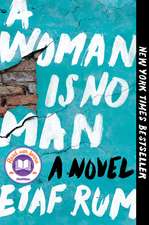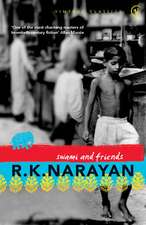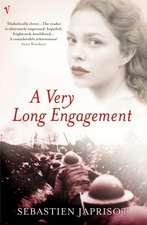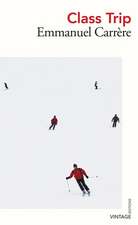The Attack
Autor Yasmina Khadra Traducere de John Cullenen Limba Engleză Paperback – 31 mar 2007
Vezi toate premiile Carte premiată
Preț: 84.76 lei
Nou
Puncte Express: 127
Preț estimativ în valută:
16.22€ • 17.67$ • 13.67£
16.22€ • 17.67$ • 13.67£
Carte indisponibilă temporar
Doresc să fiu notificat când acest titlu va fi disponibil:
Se trimite...
Preluare comenzi: 021 569.72.76
Specificații
ISBN-13: 9780307275707
ISBN-10: 0307275701
Pagini: 272
Dimensiuni: 135 x 201 x 15 mm
Greutate: 0.2 kg
Editura: Anchor Books
ISBN-10: 0307275701
Pagini: 272
Dimensiuni: 135 x 201 x 15 mm
Greutate: 0.2 kg
Editura: Anchor Books
Notă biografică
Yasmina Khadra is the nom de plume of the former Algerian army officer Mohammed Moulessehoul. He is the author of six other books published in English, among them The Swallows of Kabul, In the Name of God, and Wolf Dreams. He lives in France.
Extras
After the operation, Ezra Benhaim, our hospital director, comes to see me in my office. He's an alert, lively gentleman, despite his sixty-odd years and his increasing corpulence. Around the hospital, he's known as "the Sergeant," because he's an outrageous despot with a sense of humor that always seems to show up a little late. But when the going gets tough, he's the first to roll up his sleeves and the last to leave the shop.
Before I became a naturalized Israeli citizen, back when I was a young surgeon moving heaven and earth to get licensed, he was there. Even though he was still just a modest chief of service at the time, he used the little influence his position afforded him to keep my detractors at bay. In those days, it was hard for a son of Bedouins to join the brotherhood of the highly educated elite without provoking a sort of reflexive disgust. The other medical school graduates in my class were wealthy young Jews who wore gold chain bracelets and parked their convertibles in the hospital lot. They looked down their noses at me and perceived each of my successes as a threat to their social standing. And so, whenever one of them pushed me too far, Ezra wouldn't even want to know who started first; he took my side as a matter of course.
He pushes the door open without knocking, comes in, and looks at me with his head tilted to one side and the hint of a smile on his lips. This is his way of communicating his satisfaction. Then, after I pivot my armchair to face him, he takes off his glasses, wipes them on the front of his lab coat, and says, "It looks like you had to go all the way to the next world to bring your patient back."
"Let's not exaggerate."
He puts his glasses back on his nose, flares his unattractive nostrils, nods his head; then, after a brief meditation, his face regains its austerity. "Are you coming to the club this evening?"
"Not possible. My wife's due home tonight."
"What about our return match?"
"Which one? You haven't won a single game against me."
"You're not fair, Amin. You always take advantage of my bad days and score lots of points. But today, when I feel great, you back out."
I lean far back in my chair so I can stare at him properly. "You know what it is, my poor old Ezra? You don't have as much punch as you used to, and I hate myself for taking advantage of you."
"Don't bury me quite yet. Sooner or later, I'm going to shut you up once and for all."
"You don't need a racket for that. A simple suspension would do the trick."
He promises to think about it, brings a finger to his temple in a casual salute, and goes back to badgering the nurses in the corridors.
Once I'm alone, I try to go back to where I was before Ezra's intrusion and remember that I was about to call my wife. I pick up the phone, dial our number, and hang up again at the end of the seventh ring. My watch reads 1:12 p.m. If Sihem took the nine o'clock bus, she should have arrived home some time ago.
"You worry too much!" cries Dr. Kim Yehuda, surprising me by bursting into my cubbyhole. Continuing without pause, she says, "I knocked before I came in. You were lost in space. . . ."
"I'm sorry, I didn't hear you."
She dismisses my apology with a haughty hand, observes my furrowing brow, and asks, "Were you calling your house?"
"I can hide nothing from you."
"And, obviously, Sihem hasn't come home yet?"
Her insight irritates me, but I've learned to live with it. We've known each other since we were at the university together. We weren't in the same class--I was about three years ahead of her--but we hit it off right away. She was beautiful and spontaneous and far more open-minded than the other students, who had to bite their tongues a few times before they'd ask an Arab for a light, even if he was a brilliant student and a handsome lad to boot. Kim had an easy laugh and a generous heart. Our romance was brief and disconcertingly naïve. I suffered enormously when a young Russian god, freshly arrived from his Komsomol, came and stole her away from me. Good sport that I was, I didn't put up any fight. Later, I married Sihem, and then, without warning, very shortly after the Soviet empire fell apart, the Russian went back home; but we've remained excellent friends, Kim and I, and our close collaboration has forged a powerful bond between us.
"It's the end of the holiday today," she reminds me. "The roads are jammed. Have you tried to reach her at her grandmother's?"
"There's no telephone at the farm."
"Call her on her mobile phone."
"She forgot it at home again."
She spreads out her arms in resignation: "That's bad luck."
"For whom?"
She raises one magnificent eyebrow and shakes a warning finger at me. "The tragedy of certain well-intentioned people," she declares, "is that they don't have the courage of their commitments, and they fail to follow their ideas to their logical conclusion."
"The time is right," I say, rising from my chair. "The operation was very stressful, and we need to regain our strength. . . ."
Grabbing her by the elbow, I push her into the corridor. "Walk on ahead, my lovely. I want to see all the wonders you're pulling behind you."
"Would you dare repeat that in front of Sihem?"
"Only imbeciles never change their minds."
Kim's laughter lights up the hospital corridor like a garland of bright flowers in a home for the dying.
* * *
In the canteen, Ilan Ros joins us just as we're finishing our lunch. He sets his overloaded tray on the table and places himself on my right so that he's facing Kim. His jowls are scarlet, and he's wearing a loose apron over his Pantagruelian belly. He begins by gobbling up three slices of cold meat in quick succession and then wipes his mouth on a paper napkin. "Are you still looking for a second house?" he asks me amid a lot of voracious smacking.
"That depends on where it is."
“I think I’ve come up with something for you. Not far from Ashkelon. A pretty little villa with just what you need to tune out completely.”
My wife and I have been looking for a small house on the seashore for more than a year. Sihem loves the sea. Every other weekend, my hospital duties permitting, we get into our car and head for the beach. We walk on the sand for a long time, and then we climb a dune and stare at the horizon until late in the night. Sunsets exercise a degree of fascination on Sihem that I've never been able to get to the bottom of.
"You think I can afford it?" I ask.
Ilan Ros utters a brief laugh, and his crimson neck shakes like gelatin. "Amin, you haven't put your hand in your pocket for so long that I figure you must have plenty socked away. Surely enough to make at least half of your dreams come true . . ."
Suddenly, a tremendous explosion shakes the walls of the canteen and sets the glasses tinkling. Everyone in the place looks at one another, puzzled, and then those close to the picture windows get up from their tables and peer out. Kim and I rush to the nearest window. Outside, the people at work in the hospital courtyard are standing still, with their faces turned toward the north. The facades of the buildings across the way prevent us from seeing farther.
"That's got to be a terrorist attack," someone says.
Kim and I run out into the corridor. A group of nurses is already coming up from the basement and racing toward the lobby. Judging from the force of the shock wave, I'd say the explosion couldn't have gone off very far away. A security guard switches on his transceiver to inquire about the situation. The person he's talking to doesn't know any more than he does. We storm the elevator, get out on the top floor, and hurry to the terrace overlooking the south wing of the building. A few curious people are already there, gazing out, with their hands shading their eyes. They're looking in the direction of a cloud of smoke rising about a dozen blocks from the hospital.
A security guard speaks into his radio: "It's coming from the direction of Hakirya," he says. "A bomb, maybe a suicide bomber. Or a booby-trapped vehicle. I have no information. All I can see is smoke coming from whatever the target was."
"We have to go back down," Kim tells me.
"You're right. We have to get ready to receive the first evacuees."
Ten minutes later, bits of information combine to evoke a veritable carnage. Some people say a bus was blown up; others say it was a restaurant. The hospital switchboard is practically smoking. We've got a red alert.
Ezra Benhaim orders the crisis-management team to stand by. Nurses and surgeons go to the emergency room, where stretchers and gurneys are arranged in a frenetic but orderly carousel. This isn't the first time that Tel Aviv's been shaken by a bomb, and after each experience our responders operate with increased efficiency. But an attack remains an attack. It wears you down. You manage it technically, not humanely. Turmoil and terror aren't compatible with sangfroid. When horror strikes, the heart is always its first target.
I reach the emergency room in my turn. Ezra's in command there, his face pallid, his mobile phone glued to his ear. With one hand, he tries to direct the preparations for surgical interventions.
"A suicide bomber blew himself up in a restaurant," he announces. "There are many dead and many more wounded. Evacuate wards three and four, and prepare to receive the first victims. The ambulances are on the way."
Kim, who's been in her office doing her own telephoning, catches up with me in ward five. This is where the most gravely wounded will be sent. Sometimes the operating room's too crowded, and surgery is performed on the spot. Three other surgeons and I check the various pieces of equipment. Nurses are busy around the operating tables, making nimble, precise movements.
Kim proceeds to turn on the machines. As she does so, she informs me that there are at least eleven people dead.
Sirens are wailing outside. The first ambulances invade the hospital courtyard. I leave Kim with the machines and rejoin Ezra in the lobby. The cries of the wounded echo through the wards. A nearly naked woman, as enormous as her fright, twists around on a stretcher. The stretcher-bearers carrying her are having a hard time calming her down. She passes in front of me, with her hair standing up and her eyes bulging. Immediately behind her, a young boy arrives, covered with blood but still breathing. His face and arms are black, as though he's just come up out of a coal mine. I take hold of his gurney and wheel him to one side to keep the passage free. A nurse comes to help me.
"His hand is gone!" she cries.
"This is no time to lose your nerve," I tell her. "Put a tourniquet on him and take him to the operating room immediately. There's not a minute to spare."
"Very well, Doctor."
"Are you sure you'll be all right?"
"Don't worry about me, Doctor. I'll manage."
In the course of fifteen minutes, the lobby of the emergency room is transformed into a battlefield. No fewer than a hundred wounded people are packed into this space, the majority of them lying on the floor. All the gurneys are loaded with broken bodies, many horribly riddled with splinters and shards, some suffering from severe burns in several places. The whole hospital echoes with wailing and screaming. From time to time, a single cry pierces the din, underlining the death of a victim. One of them dies in my hands without giving me time to examine him. Kim informs me that the operating room is now completely full and that we have to start channeling the most serious cases to ward five. A wounded man demands to be treated immediately. His back is flayed from one end to the other, and part of one bare shoulder blade is showing. When he sees that no one is coming to his aid, he grabs a nurse by the hair. It takes three strapping young men to make him let go. A little farther on, another injured man, his body covered with cuts, screams and thrashes about madly, lunging so hard that he falls off his stretcher, which is wedged between two gurneys. He lies on the floor and slashes with his fists at the empty air. The nurse who's trying to care for him looks overwhelmed. Her eyes light up when she notices me.
"Oh, Dr. Amin. Hurry, hurry. . . ."
Suddenly, the injured man stiffens; his groans, his convulsions, his flailing all cease at once, his body grows still, and his arms fall across his chest, like a puppet whose strings have just been cut. In a split second, the expression of pain on his flushed features changes to a look of dementia, a mixture of cold rage and disgust. When I bend over him, he glowers at me menacingly, his teeth bared in a ferocious grimace. He pushes me away with a fierce thrust of his hand and mutters, "I don't want any Arab touching me. I'd rather croak."
I seize his wrist and force his arm down to his side. "Hold him tight," I tell the nurse. "I'm going to examine him."
"Don't touch me," the injured man says, trying to rise. "I forbid you to lay a hand on me."
He spits at me, but he's breathless, and his saliva lands on his chin, viscid and shimmering. Furious tears start spilling over his eyelids. I remove his jacket. His stomach is a spongy mass of pulped flesh that contracts whenever he makes an effort. He's lost a great deal of blood, and his cries only serve to intensify his hemorrhaging.
"He has to be operated on right away."
I signal to a male nurse to help me put the injured man back on his stretcher. Then, pushing aside the gurneys blocking our path, I make for the operating room. The patient stares at me, his hate-filled eyes on the point of rolling back into his head. He tries to protest, but his contortions have worn him out. Prostrate and helpless, he turns his head away so he won't have to look at me and surrenders to the drowsiness he can no longer resist.
From the Hardcover edition.
Before I became a naturalized Israeli citizen, back when I was a young surgeon moving heaven and earth to get licensed, he was there. Even though he was still just a modest chief of service at the time, he used the little influence his position afforded him to keep my detractors at bay. In those days, it was hard for a son of Bedouins to join the brotherhood of the highly educated elite without provoking a sort of reflexive disgust. The other medical school graduates in my class were wealthy young Jews who wore gold chain bracelets and parked their convertibles in the hospital lot. They looked down their noses at me and perceived each of my successes as a threat to their social standing. And so, whenever one of them pushed me too far, Ezra wouldn't even want to know who started first; he took my side as a matter of course.
He pushes the door open without knocking, comes in, and looks at me with his head tilted to one side and the hint of a smile on his lips. This is his way of communicating his satisfaction. Then, after I pivot my armchair to face him, he takes off his glasses, wipes them on the front of his lab coat, and says, "It looks like you had to go all the way to the next world to bring your patient back."
"Let's not exaggerate."
He puts his glasses back on his nose, flares his unattractive nostrils, nods his head; then, after a brief meditation, his face regains its austerity. "Are you coming to the club this evening?"
"Not possible. My wife's due home tonight."
"What about our return match?"
"Which one? You haven't won a single game against me."
"You're not fair, Amin. You always take advantage of my bad days and score lots of points. But today, when I feel great, you back out."
I lean far back in my chair so I can stare at him properly. "You know what it is, my poor old Ezra? You don't have as much punch as you used to, and I hate myself for taking advantage of you."
"Don't bury me quite yet. Sooner or later, I'm going to shut you up once and for all."
"You don't need a racket for that. A simple suspension would do the trick."
He promises to think about it, brings a finger to his temple in a casual salute, and goes back to badgering the nurses in the corridors.
Once I'm alone, I try to go back to where I was before Ezra's intrusion and remember that I was about to call my wife. I pick up the phone, dial our number, and hang up again at the end of the seventh ring. My watch reads 1:12 p.m. If Sihem took the nine o'clock bus, she should have arrived home some time ago.
"You worry too much!" cries Dr. Kim Yehuda, surprising me by bursting into my cubbyhole. Continuing without pause, she says, "I knocked before I came in. You were lost in space. . . ."
"I'm sorry, I didn't hear you."
She dismisses my apology with a haughty hand, observes my furrowing brow, and asks, "Were you calling your house?"
"I can hide nothing from you."
"And, obviously, Sihem hasn't come home yet?"
Her insight irritates me, but I've learned to live with it. We've known each other since we were at the university together. We weren't in the same class--I was about three years ahead of her--but we hit it off right away. She was beautiful and spontaneous and far more open-minded than the other students, who had to bite their tongues a few times before they'd ask an Arab for a light, even if he was a brilliant student and a handsome lad to boot. Kim had an easy laugh and a generous heart. Our romance was brief and disconcertingly naïve. I suffered enormously when a young Russian god, freshly arrived from his Komsomol, came and stole her away from me. Good sport that I was, I didn't put up any fight. Later, I married Sihem, and then, without warning, very shortly after the Soviet empire fell apart, the Russian went back home; but we've remained excellent friends, Kim and I, and our close collaboration has forged a powerful bond between us.
"It's the end of the holiday today," she reminds me. "The roads are jammed. Have you tried to reach her at her grandmother's?"
"There's no telephone at the farm."
"Call her on her mobile phone."
"She forgot it at home again."
She spreads out her arms in resignation: "That's bad luck."
"For whom?"
She raises one magnificent eyebrow and shakes a warning finger at me. "The tragedy of certain well-intentioned people," she declares, "is that they don't have the courage of their commitments, and they fail to follow their ideas to their logical conclusion."
"The time is right," I say, rising from my chair. "The operation was very stressful, and we need to regain our strength. . . ."
Grabbing her by the elbow, I push her into the corridor. "Walk on ahead, my lovely. I want to see all the wonders you're pulling behind you."
"Would you dare repeat that in front of Sihem?"
"Only imbeciles never change their minds."
Kim's laughter lights up the hospital corridor like a garland of bright flowers in a home for the dying.
* * *
In the canteen, Ilan Ros joins us just as we're finishing our lunch. He sets his overloaded tray on the table and places himself on my right so that he's facing Kim. His jowls are scarlet, and he's wearing a loose apron over his Pantagruelian belly. He begins by gobbling up three slices of cold meat in quick succession and then wipes his mouth on a paper napkin. "Are you still looking for a second house?" he asks me amid a lot of voracious smacking.
"That depends on where it is."
“I think I’ve come up with something for you. Not far from Ashkelon. A pretty little villa with just what you need to tune out completely.”
My wife and I have been looking for a small house on the seashore for more than a year. Sihem loves the sea. Every other weekend, my hospital duties permitting, we get into our car and head for the beach. We walk on the sand for a long time, and then we climb a dune and stare at the horizon until late in the night. Sunsets exercise a degree of fascination on Sihem that I've never been able to get to the bottom of.
"You think I can afford it?" I ask.
Ilan Ros utters a brief laugh, and his crimson neck shakes like gelatin. "Amin, you haven't put your hand in your pocket for so long that I figure you must have plenty socked away. Surely enough to make at least half of your dreams come true . . ."
Suddenly, a tremendous explosion shakes the walls of the canteen and sets the glasses tinkling. Everyone in the place looks at one another, puzzled, and then those close to the picture windows get up from their tables and peer out. Kim and I rush to the nearest window. Outside, the people at work in the hospital courtyard are standing still, with their faces turned toward the north. The facades of the buildings across the way prevent us from seeing farther.
"That's got to be a terrorist attack," someone says.
Kim and I run out into the corridor. A group of nurses is already coming up from the basement and racing toward the lobby. Judging from the force of the shock wave, I'd say the explosion couldn't have gone off very far away. A security guard switches on his transceiver to inquire about the situation. The person he's talking to doesn't know any more than he does. We storm the elevator, get out on the top floor, and hurry to the terrace overlooking the south wing of the building. A few curious people are already there, gazing out, with their hands shading their eyes. They're looking in the direction of a cloud of smoke rising about a dozen blocks from the hospital.
A security guard speaks into his radio: "It's coming from the direction of Hakirya," he says. "A bomb, maybe a suicide bomber. Or a booby-trapped vehicle. I have no information. All I can see is smoke coming from whatever the target was."
"We have to go back down," Kim tells me.
"You're right. We have to get ready to receive the first evacuees."
Ten minutes later, bits of information combine to evoke a veritable carnage. Some people say a bus was blown up; others say it was a restaurant. The hospital switchboard is practically smoking. We've got a red alert.
Ezra Benhaim orders the crisis-management team to stand by. Nurses and surgeons go to the emergency room, where stretchers and gurneys are arranged in a frenetic but orderly carousel. This isn't the first time that Tel Aviv's been shaken by a bomb, and after each experience our responders operate with increased efficiency. But an attack remains an attack. It wears you down. You manage it technically, not humanely. Turmoil and terror aren't compatible with sangfroid. When horror strikes, the heart is always its first target.
I reach the emergency room in my turn. Ezra's in command there, his face pallid, his mobile phone glued to his ear. With one hand, he tries to direct the preparations for surgical interventions.
"A suicide bomber blew himself up in a restaurant," he announces. "There are many dead and many more wounded. Evacuate wards three and four, and prepare to receive the first victims. The ambulances are on the way."
Kim, who's been in her office doing her own telephoning, catches up with me in ward five. This is where the most gravely wounded will be sent. Sometimes the operating room's too crowded, and surgery is performed on the spot. Three other surgeons and I check the various pieces of equipment. Nurses are busy around the operating tables, making nimble, precise movements.
Kim proceeds to turn on the machines. As she does so, she informs me that there are at least eleven people dead.
Sirens are wailing outside. The first ambulances invade the hospital courtyard. I leave Kim with the machines and rejoin Ezra in the lobby. The cries of the wounded echo through the wards. A nearly naked woman, as enormous as her fright, twists around on a stretcher. The stretcher-bearers carrying her are having a hard time calming her down. She passes in front of me, with her hair standing up and her eyes bulging. Immediately behind her, a young boy arrives, covered with blood but still breathing. His face and arms are black, as though he's just come up out of a coal mine. I take hold of his gurney and wheel him to one side to keep the passage free. A nurse comes to help me.
"His hand is gone!" she cries.
"This is no time to lose your nerve," I tell her. "Put a tourniquet on him and take him to the operating room immediately. There's not a minute to spare."
"Very well, Doctor."
"Are you sure you'll be all right?"
"Don't worry about me, Doctor. I'll manage."
In the course of fifteen minutes, the lobby of the emergency room is transformed into a battlefield. No fewer than a hundred wounded people are packed into this space, the majority of them lying on the floor. All the gurneys are loaded with broken bodies, many horribly riddled with splinters and shards, some suffering from severe burns in several places. The whole hospital echoes with wailing and screaming. From time to time, a single cry pierces the din, underlining the death of a victim. One of them dies in my hands without giving me time to examine him. Kim informs me that the operating room is now completely full and that we have to start channeling the most serious cases to ward five. A wounded man demands to be treated immediately. His back is flayed from one end to the other, and part of one bare shoulder blade is showing. When he sees that no one is coming to his aid, he grabs a nurse by the hair. It takes three strapping young men to make him let go. A little farther on, another injured man, his body covered with cuts, screams and thrashes about madly, lunging so hard that he falls off his stretcher, which is wedged between two gurneys. He lies on the floor and slashes with his fists at the empty air. The nurse who's trying to care for him looks overwhelmed. Her eyes light up when she notices me.
"Oh, Dr. Amin. Hurry, hurry. . . ."
Suddenly, the injured man stiffens; his groans, his convulsions, his flailing all cease at once, his body grows still, and his arms fall across his chest, like a puppet whose strings have just been cut. In a split second, the expression of pain on his flushed features changes to a look of dementia, a mixture of cold rage and disgust. When I bend over him, he glowers at me menacingly, his teeth bared in a ferocious grimace. He pushes me away with a fierce thrust of his hand and mutters, "I don't want any Arab touching me. I'd rather croak."
I seize his wrist and force his arm down to his side. "Hold him tight," I tell the nurse. "I'm going to examine him."
"Don't touch me," the injured man says, trying to rise. "I forbid you to lay a hand on me."
He spits at me, but he's breathless, and his saliva lands on his chin, viscid and shimmering. Furious tears start spilling over his eyelids. I remove his jacket. His stomach is a spongy mass of pulped flesh that contracts whenever he makes an effort. He's lost a great deal of blood, and his cries only serve to intensify his hemorrhaging.
"He has to be operated on right away."
I signal to a male nurse to help me put the injured man back on his stretcher. Then, pushing aside the gurneys blocking our path, I make for the operating room. The patient stares at me, his hate-filled eyes on the point of rolling back into his head. He tries to protest, but his contortions have worn him out. Prostrate and helpless, he turns his head away so he won't have to look at me and surrenders to the drowsiness he can no longer resist.
From the Hardcover edition.
Recenzii
“Engrossing…audaciously conceived, courageously important [and] urgently humane, The Attack is Khadra’s best and most ambitious novel yet.” —The Los Angeles Time“A genuine work of art.” —The Philadelphia Inquirer“Gripping, dynamic. . . .Both a fierce rendering of geopolitical tensions and a plea for peace.” —Tne New York Times “A powerfully dark vision . . . of the [Arab-Israeli] conflict.” —The New Yorker“An engaging glimpse into the kinds of stories we never hear on CNN.” —TimeOut Chicago
Descriere
Khadra portrays the reality of terrorism and its incalculable spiritual costs. Intense and humane, devoid of political bias, hatred, and polemics, it probes deep inside the Muslim world and gives readers a profound understanding of what seems impossible to understand.
Premii
- International IMPAC Dublin Literary Award Nominee, 2008
















